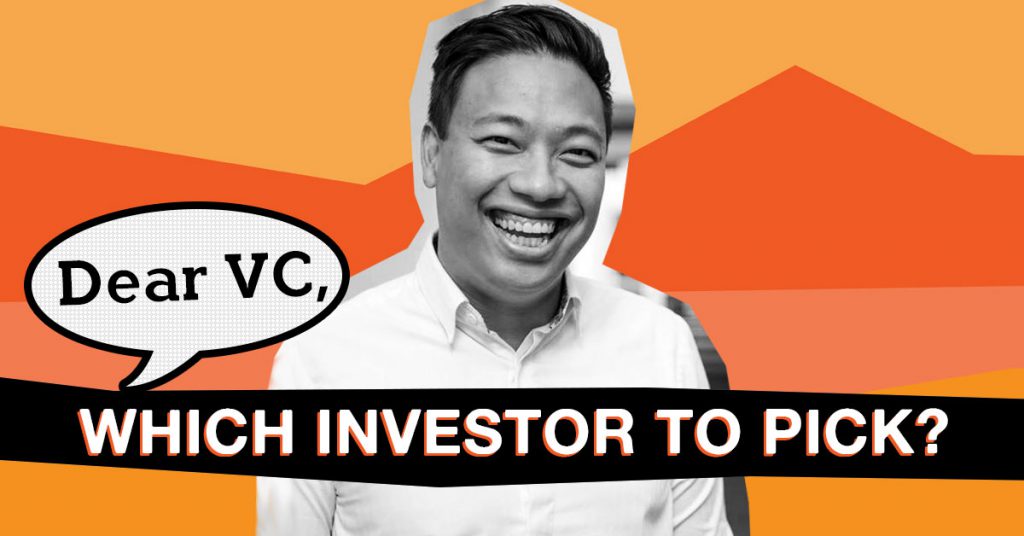- In this installment of Dear VC, James Digby of 3B Ventures address the curious question of how to choose the best investor for your business, and also tackles the topic of social enterprise funding in Malaysia.
###
Dear VC,
My question is really simple—when a startup receives interest from multiple VCs but doesn’t want to accept funding from all of them, what should the startup founder take into consideration when deciding between which VC and partner he or she wants to go with?
What makes one VC more compatible for his/her business than another in the long run, and how can one distinguish a good VC from a great VC?
– Ray
Hi Ray,
Congratulations on the successful raise! There are a few considerations you should take into account when you select your investment partner:
Firstly, look past the firm itself offering you the deal; they are important, as their credibility will allow you to leverage the best deals throughout their network, but not as important as the partner in the firm who is personally backing you.
VCs are not just giving you finance—most probably they will have a seat at the board. Having a board member isn’t like when you make an employee hire—this person will be on your board and will probably shape the way that your company is run for the lifetime of your business.
It means that you have to look at a number of factors around that individual: Why do they believe in your company? Is it for the fear of missing out because you’re a hot commodity? Or do they have conviction in your business model, team and management style?
Also look towards the personal management style of the partner—are they a soft or hard advisor? Do they give you advice and trust in you to execute to the best of your belief (soft) or do they demand you do what they say, even though you could think they are wrong (hard)?
At 3B, we work with CSX to provide detailed personality testing to make sure founders and team members understand how best to communicate together, through the highs and lows. You’ve got to make sure they’ve got the right personality to work with you and your team for the next decade. This will be probably the most important decision you make along your startup journey, so choose wisely.
In summary, don’t be afraid to ask the questions and reference check your VCs. You’ve got to do your own due diligence as you would expect for the VC partner to do with you, and don’t be shy about asking “Why do you want to invest in my company?” or “What will you bring to the table?”.
Finding that person who wholeheartedly believes and trusts in your vision will make the crazy path to entrepreneurial success that much easier!
###
Dear VC,
Do you feel that there are enough funding opportunities for social enterprises in Malaysia? If you consider that social enterprises don’t typically offer exciting exit opportunities for VCs, what other reasons would investors have to consider even putting funds in a social enterprise?
Also, let’s say that there is the off-chance a VC would consider going into a social enterprise, what metrics would the investor consider (as compared to a traditional startups and companies)?
– Syafiq
Hi Syafiq,
There are a number of programmes in Malaysia, and probably more so than most other counties in the region! Thanks to the likes of MaGIC, we’ve seen a great spotlight on highlighting the needs of social enterprises with great execution. Programmes such as Social Enterprise Ventures and IDEA are a fantastic place to start.
Sometimes however, there is confusion between social businesses/social enterprises. Professor Muhammed Yunus, founder of Grameen Bank and the one who coined the term “Social Business” describes it as:
“A non-dividend company created to solve a social problem. Like an NGO, it has a social mission, but like a business, it generates its own revenues to cover its costs. While investors may recoup their investment, all further profits are reinvested into the same or other social business.”
This means that by its very nature, there is no way for a VC to generate any profit from an investment, something of which is not part of a VC business model—thereby it simply cannot invest into a company like that.
On the other hand however, there are plenty of opportunities for VCs in the impact space. At 3B, we’re only looking to invest into innovation that can impact the lives of the next 3 billion—but as with every VC, we’re also focused on generating returns for our investors.
There are plenty of ways to incorporate an impact thesis into your business model, that doesn’t need to be a BOGO (Buy One, Give One: aka Tom’s shoes) model and ensure that you have a scale-able profitable business that can be socially driven.
No matter what, when approaching a VC, you’ve got to be looking to present a company that has the potential to make substantial returns on investment with a proven business model (in some scale).
Typically also, a VC or professional investor would be the last port of call when raising funding, so with every opportunity (not just social) we’re looking into how this company can provide value and returns if we put in $(x) + time + network and sweat to get them to where they need to go.
Fundraising is never easy, social or otherwise—but you’ve got to look at the opportunities presented and make sure everyone involved is getting the best returns.
###
James Digby is a Managing Partner at 3B Ventures, focusing on investing into innovation that can impact the lives of the next 3 billion. He is also a founding Partner at the Global Startup Awards, a pan regional startup competition that recognises entrepreneurs and their respective supporting ecosystems in 53 countries around the world, and co-founded the award-winning startup incubator Rockstart Accelerator in Amsterdam, Netherlands.
James has also served on the management team and a personal mentor for a number of startups that have gone on to raise significant funding and global traction, recently with the award-winning AIRTAME wireless HDMI streaming device that became the most publicly backed crowd funded project in Europe on Indiegogo of all time.
- Dear VC is a series where we get experienced venture capitalists to answer startup, funding, and venture capital-related questions from our readers. If you have a question you’d like to ask, please fill out our questionnaire here.
- You can also find more investor insights by reading our previous Dear VC segments here.













